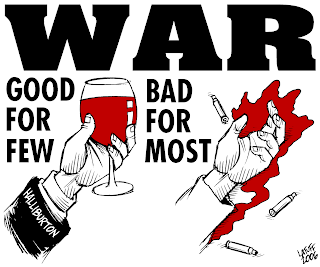
’In accordance with the principles of double-think it does not matter
if the war is not real. For when it is, victory is not possible. The
war is not meant to be won, but it is meant to be continuous.’ (George Orwell, 1984; quoted at the end of Michael Moore's Fahrenheit 9/11)
if the war is not real. For when it is, victory is not possible. The
war is not meant to be won, but it is meant to be continuous.’ (George Orwell, 1984; quoted at the end of Michael Moore's Fahrenheit 9/11)
Although American support for the Iraq war has been declining, Michael Moore's "Fahrenheit 9/11" failed to gain the massive support of military personal or succeed in booting Bush out of office in the 2004 presidential election. Although this movie very much preaches to the anti-Bush choir, this movie was not made for political junkies or active, voting citizens alone. It was made with the hope that it will be seen by those who have not really been paying much attention or asking questions. Who have, for whatever reason, decided that what happens in the halls of power does not have that much to do with them. It is an impassioned plea to ordinary Americans to "Pay attention!" and as the film pleas with the audience at the end "Do something!", unfortunately it failed to have a widespread impact. President Bush was reelected to a second term and the war continues even today.
Can Moore's work simply be dismissed as propaganda? According to Patricia Aufderheide, "propaganda documentaries are made to convince viewers of an organization's point of view or cause" and they "peddle the convictions not of the filmmaker but of the organization" (Documentary Film, 65). Moore's film is merely an independent one, which although angry and with an implicit goal to be a "direct intervention in public conversation" (78), it is merely the view of one man and does not represent the opinion of an entire organization. Much to the dismay of some who like to try to pass off Moore as merely a puppet of "the Liberals".
Even before its release "Fahrenheit 9/11" garnered controversy when the Walt Disney Company prevented its Miramax division from distributing the film and many people already formed their opinions on the film without seeing it. Although I agree with probably the majority of Moore's politics and think that there were nefarious motivations behind the decision to invade Iraq, I cannot help but disagree with his approach in this film. The movie which many believed would be all about Bush portrayed the army in a negative light to illustrate a point and this lost the broader support he could have garnered from those in the military and their families. While there may be a valid point that soldiers are sometimes thrown into wars with no perspective on how to rationalize killing or come to terms with their friends’ untimely deaths and that this can distort the soldier’s perceptions of right and wrong, this was glossed over in favor of a more simplistic view. Clips of soldiers interviewed on active duty are shown talking about what type of music they listen to in the tanks or they are shown shoving guns into the faces of a crying family with no explanation of why the soldiers are there in the first place. To soldiers who viewed the film they felt they were made to appear at first as psychopathic killers and then as poor kids of color, who are merely acted upon rather than actors in the events shown in the film. These two polar opposites do not take into account the realities of war nor the complexities of humans. There is a complex relationship that exists between the war experience and storytelling and Moore fails in his endeavor by refusing to get out of the way and to let the story tell itself.
By showing the horrors of war in graphic unflinching detail, Moore is attempting to shock the viewer and this blend of news footage and filmed commentary is occasionally effective, particularly when Moore lets the footage speak for itself. Unfortunately, he is unable to do this and must constantly inject himself into the film, with voice-over narration of jokes and amusing pictures/clips that are deemed more valuable than convincing logic; presenting crucial information in a manner that is irrefutable is less important than the slapdash connections he makes between various facts and events. The clear implication is that the truth is not only radical, but too radical to be part of an acceptable mainstream dialogue.

No comments:
Post a Comment
Note: Only a member of this blog may post a comment.